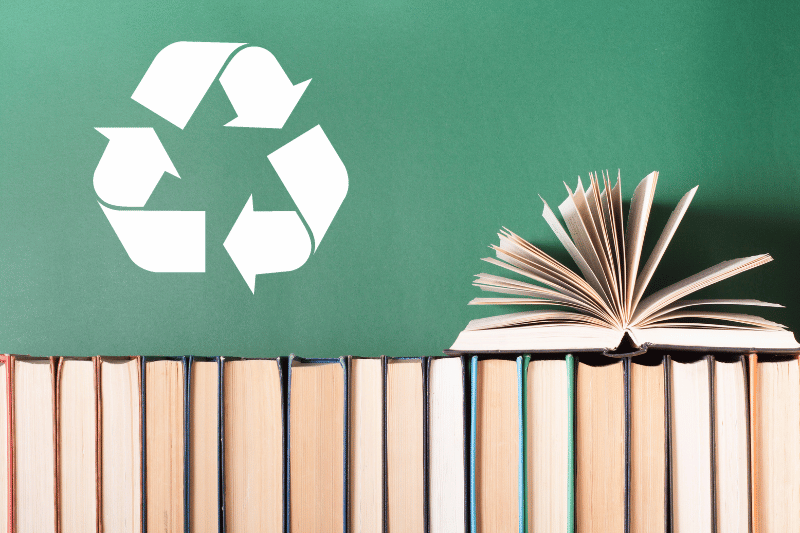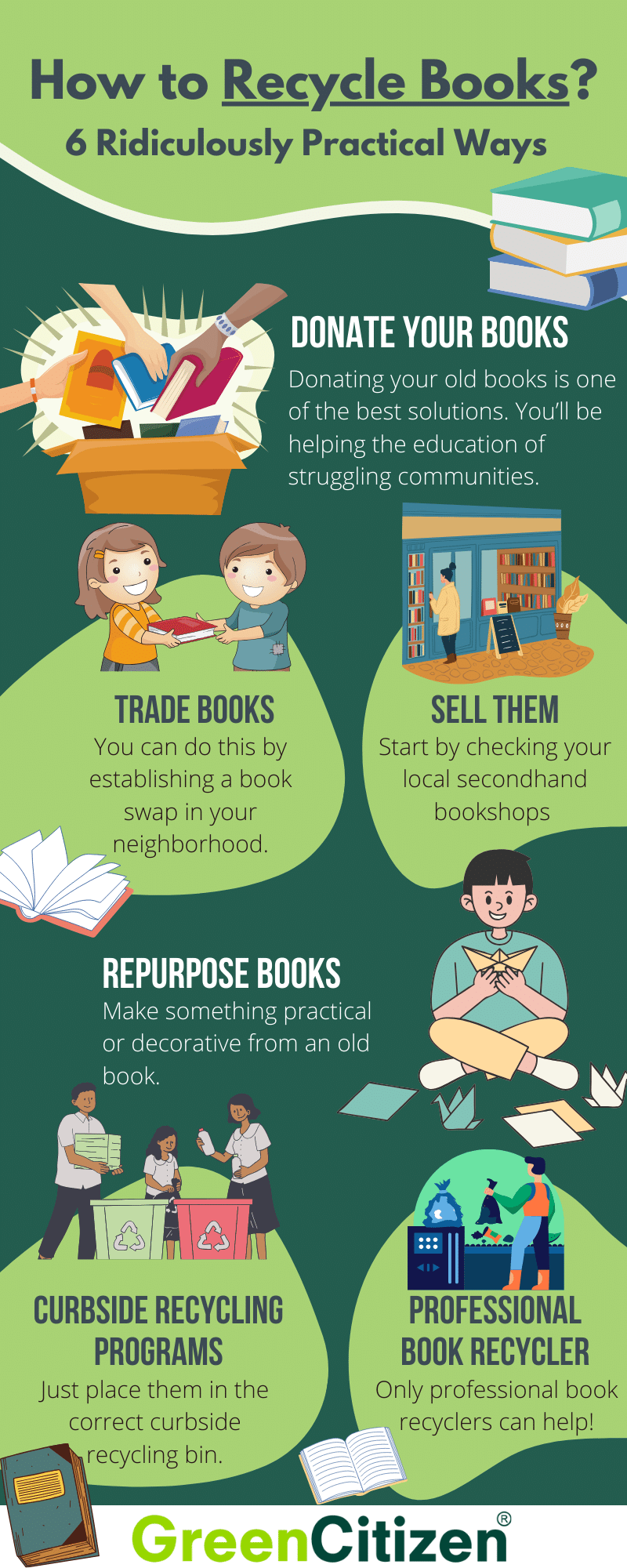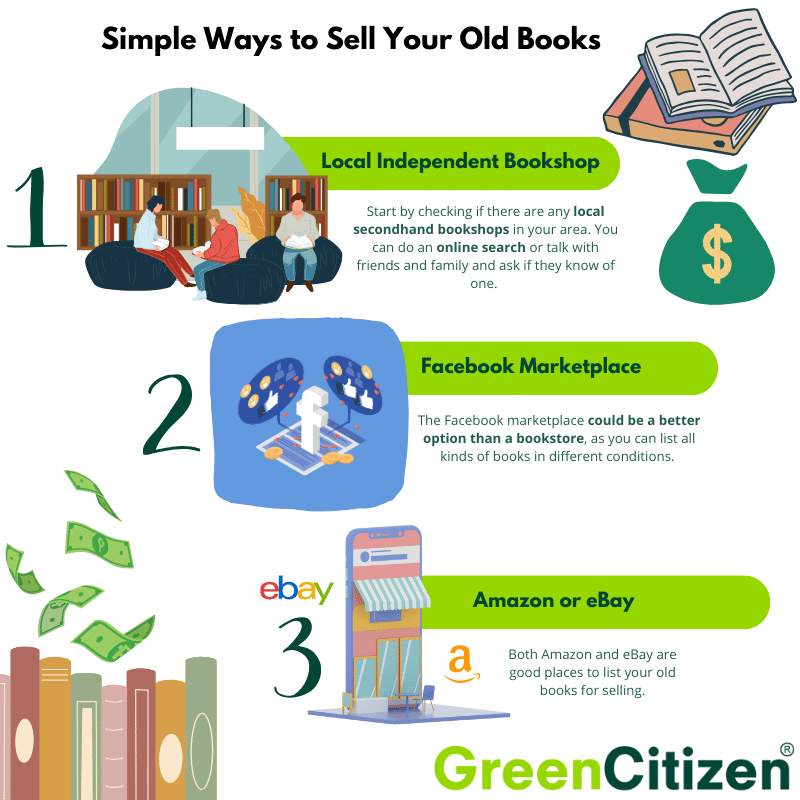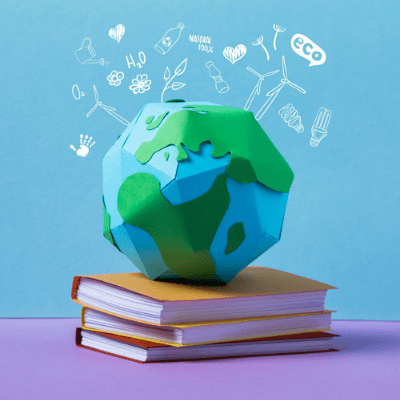People have been saying that printed books are going away.
But the facts say otherwise.
According to Statista, 788.7 million printed books were sold in the US in 2022. It’s pretty evident that printed books are still the most popular choice among bookworms.
But what happens with all of them once they’re read?
Sadly, about 320 million books end up in landfills every year, while the population of developing nations can’t get enough books for their education.
Plus, if we just recycled all the printed newspapers in the world, we could save 250,000,000 trees from being cut down each year.
There’s no point in having your shelves collapse from the weight of all the volumes you’ve stacked. Ideally, we should transfer knowledge to others. There’s no better way of doing that than by sharing our books.
Today, I’ll talk about everything you should know about how to donate, dispose of, and where to recycle books responsibly so we can preserve knowledge and not harm our environment.
Can You Recycle Books?
Yes, you can recycle books, but the process varies depending on the type of book. Most books are recyclable in theory. However, there are certain considerations you should take into account to ensure they are processed correctly.

Let’s talk about common options one by one.
Paperbacks are the easiest to recycle. Their pages are typically made from paper similar to that of standard office paper, and they can often be recycled in the same bin as your other paper products.
Before recycling, remove any plastic wrapping and check if the cover needs to be separated from the pages due to a plastic coating.
Hardcovers require a bit more effort. Their rigid covers and the glue binding can’t always go into the paper recycling bin.
You’ll need to strip off the cover and the spine, which are usually made of non-recyclable materials like cloth, leather, or plastic, and only recycle the inner paper pages.
Books with leather covers, like some collectible or antique volumes, pose a more significant challenge. Leather is not recyclable through conventional paper recycling systems due to its animal hide composition.
For these books, consider donating them if they are still in readable condition. If they are beyond use, look for a specialist recycling center that handles mixed materials.
For all types of books, remember that the goal is to ensure the paper can be reclaimed and reused. If recycling isn’t an option, consider other ways to give books a second life, such as donating to libraries, second-hand bookstores, or educational charities.
In this way, you not only contribute to environmental sustainability but also to spreading knowledge and literacy.
How to Recycle Books: 6 Simple Ways
I recently moved homes and was shocked to find out just how many books I’ve accumulated.
Let’s be honest.
I haven’t opened some of these for more than five years.
For example, I found that college students use five to seven textbooks per semester, which amounts to 40 to 60 textbooks during four years. I admit I had even more textbooks. And that’s not to mention all the novels I bought along the way.

So, if you’re in the same situation, here’s how to recycle books and do textbook recycling.
1. Donate Your Books
Donating your old books is one of the best solutions for getting rid of them, especially if you don’t want to deal with the hassle of reselling or finding book recyclers near you.
You can donate to your local community or an organization that gives books to underserved communities worldwide.
Donating locally is usually more convenient and will have a lower carbon footprint. However, by donating to other countries, you’ll be helping the education of struggling communities.
More on places you can donate your old books to below.
2. Trade Books
Another good option to prevent books from ending in a landfill is to trade them. You can do this by establishing a book swap in your neighborhood.
Consider places such as a store, a local coffee shop, or a community center.
This is a fun way to get to know your neighbors better, and it’s a way to give a textbook to someone who might urgently need it. Not to mention, you may find a new favorite book yourself.
If you’re not sure how to start a book swap, a good idea is to talk with the venue manager and share your ideas. Or, you can use social media to find other people from your area who might be interested.
Trading books may especially be helpful if you’re a student. You can create a book swap group with older and younger student generations, so they can share textbooks between themselves.
You can also use a website called Paperback Swap. Their users make a list of books they want to share and request any book they want to read themselves. It’s just like borrowing a book from a friend, except you’ll have millions of them.
There are similar sites such as Book Crossing and BookMooch.
3. Sell Your Old Books
Nobody ever said no to some extra cash!
One of the best ways to get this cash is to sell your old books. Book sales are a great way to get rid of old textbooks and get new books or magazines.
There are many options where you can sell books you no longer need or want.

Sell at a Local Independent Bookshop or Half Price Bookstore
Start by checking if there are any local secondhand bookshops in your area. You can do an online search or talk with friends and family and ask if they know of one. Then, you can contact the bookshop and ask what kind of books they accept and what’s the compensation.
You can talk with both secondhand bookshops and chains such as Half Price Books to see who’ll give you a better deal.
Some bookstores will give you cash, while others will offer store credit.
It’s up to you which one you prefer.
One thing to keep in mind here is the condition of your book. In general, bookstores will only accept books in good condition, which makes sense because who wants a tattered book that’s falling apart?
Some stores may ask you to bring your books for review. You can also ask about this when you first contact them.
Sell Books on Facebook Marketplace
The Facebook marketplace could be a better option than a bookstore, as you can list all kinds of books in different conditions.
However, keep in mind that many users don’t want to pick up just a book or two, but groups of them. It may be better to sell books in groups of related titles or combine books in groups of similar genres, styles, and reading levels.
Sell on Amazon and eBay
Another good place to sell books is Amazon and eBay. Amazon has a really good secondhand platform. I especially like how easy it is to scan the ISBN number to find out the general selling price of a title on Amazon.
eBay is another good option for selling books, especially if you already have an account. However, keep in mind that on eBay you have to communicate with the buyers directly. You’re also in charge of shipping, so eBay takes slightly more work than Amazon. However, on eBay, you can set the price yourself.
4. Repurpose Books
Here’s something for all of you creative types — make something practical or decorative from an old book.
As always, Pinterest is your best friend when it comes to finding ways to repurpose old books.
For example, I found a cool idea on how to make a coffee table or a Christmas tree out of textbooks. You can also use pages of old phone books or books that are missing pages to make envelopes. You can use these to gift cards or cash.
I also used old books to make gift tags. If you have a book that can’t be donated or sold, you can make a gift tag and write a message with a dark marker.
Finally, use books as decoration.
For example, use pictures from children’s books to decorate a kid’s bedroom.
Every time you repurpose a book, you prevent it from being sent to the landfill, so let your imagination run wild.
5. Recycle Books Through Curbside Recycling Programs
Books in poor condition, old books, or phone books can be recycled through curbside recycling programs. Just place them in the correct curbside recycling bin.
You might have to remove the cover from hardcover books to recycle your books because it contains thread, plastic, and glue.
In case your area doesn’t have a curbside recycling program, you can send the books to local recycling depots.
6. Find a Professional Book Recycler
Finally, you can recycle books by sending them to a professional book recycler. They will dispose of the book responsibly and in a professional manner that doesn’t harm the environment.
Where to Donate Old Books?
The condition of your books is the most important thing to keep in mind when donating. If a book is outdated or in poor condition, for example, missing pages, moldy, or has writing in it, it won’t be useful to anyone.
Here’s a good rule to stick to when donating: if you wouldn’t give a book to a friend, it might not be the best choice for donation either.
There are many organizations that can help you donate books. Many of them give books to diverse groups, so you can feel good knowing you’ve helped someone and your books will be used for a good cause.

Here are some of the best options for book donations.
1. Local Libraries
Libraries are the pillars of a community, and many of them accept book donations. However, keep in mind that some libraries get large amounts of irrelevant books, so they may be strict about what donations they accept.
Also, some libraries don’t have enough shelf space, so they only accept books that they know will circulate regularly.
It’s best to contact your local library and ask them what books they need. Some libraries will also accept books they don’t necessarily need, such as magazines and other paper products, and will resell them and use the money to fund other programs.
2. Little Free Libraries
Little Free Library has book-sharing boxes that function on a book swap principle. There are over 32,000 little libraries across 50 states and other countries.
These are free-standing book cabinets, bigger than a mailbox. It doesn’t cost anything to take or donate a book to Little Free Library, and it’s a great way to help the community.
You can go to their official website and find a location near you.
Keep in mind these are smaller boxes, so they won’t fit a large donation. But, if you have a few books you want to give away, it’s a good choice.
3. Better World Books
This organization collects and sells donated books to fund literacy initiatives worldwide.
So far, Better World Books has made over $33 million for literacy and education. Just go to their website, and you too can be a part of their work.
Do you know the best part?
This company has recycled close to 400 million books so far!
4. Books Through Bars
You can also donate books to inmates.
Many prisons or detention centers accept books, especially fiction. They have libraries that inmates can use.
You can use a Books Through Bars program, which gives books to people in prison throughout the US.
5. Charity Programs
Two of the most popular charities are Goodwill and Salvation Army. They also accept books.
Goodwill has been around for more than 115 years. They help local communities by selling donated items and using the proceeds to fund career training, childcare, and education for people in need.
Goodwill has locations all over the US, so you can check their website for the one closest to you.
The Salvation Army also accepts books, even textbooks. The donations go to the Salvation Army Family Stores. Like Goodwill, they also use the funds they raise to fund programs that help people in need.
Goodwill and Salvation Army are always great choices for book donations, but you can find other charities and thrift stores in your area that conduct book drives as well.
6. Literacy Programs and Schools
When it comes to literacy programs, you can donate to local or global ones.
If you want to donate locally, check out the Laundry Cares.
They sponsor a laundromat literacy program. Laundromats have reading corners, so people can read books while waiting for their clothes to be washed.
Or, you can donate globally. A good organization is Books for Africa.
They accept almost all kinds of books and ship them exclusively to Africa to help the education of people who live there.
If you want to donate textbooks, you can consider the Bridge to Asia program, which helps teachers and students in China get a hold of textbook publishers that aren’t available in China.
If you want to donate to a school, start by talking with schools in your area and see if they need any specific books for their student bodies.
Schools always want classic books on school reading lists. These get snapped up very fast, especially once the hold list gets long.
Apart from schools, you can donate books to local daycare centers.
Where to Recycle Books?
The best way to recycle a book is to donate it. However, if you don’t want to deal with finding the place for donation, you don’t want to hassle with transport and shipping, or this simply isn’t an option for you, the next best thing is to find a book recycling center.
They will know what to do with old textbooks and how to recycle hardcover books.
You can also recycle a book by using curbside recycling and dumping it in the proper bin. But, if there’s no recycling service, or you don’t know where to recycle your textbooks, you can find a recycling center.
Simply go to Green Citizen’s Green Directory.
In the “Search for” bar, enter books. And, in the location, type in your address or zip code, and press search.
You’ll get a ton of results in a matter of seconds. You can even choose how far from you the recycling center is. You can select the distance from 5 to 100 miles.

A professional book recycler is one of the best book recycling options because they can make paper from old books. They tear up the books into scraps of paper and then place them into large processors.
Then they add water and blend the paper until there’s a smooth pulp. The pulp goes into mold and deckle and is placed in water. The deckle is placed screen-side over the mold and placed in water, then lifted up until the water is drained through the holes.
Once most of the water has drained, a sponge is used to dab excess water. Once the paper is damp, it’s hung on a clothesline to dry. Once it’s dry, the paper is ready to be used.
Understanding the Paper Recycling Process

Let’s discuss how paper recycling works, shall we?
Picture this: after you toss your old newspapers or that thriller you devoured last week into the recycling bin, they embark on quite the adventure. The journey is all about giving that paper a new lease on life.
And, it’s pretty fascinating.
First off, your recycled paper pals meet up at a sorting center, where they’re separated by type and grade. Then they hit the conveyor belts and take a dive into a pulper — a huge blender that mixes them with water and turns them into a slushy mess. This pulp is then cleaned and de-inked, stripping away all the old inky stories and doodles.
After a good rinse, the clean pulp is flattened, dried, and rolled into new paper.
From old to new, ready to tell a brand new tale.
Can You Recycle Paperback Books?
Oh, absolutely! Recycling your well-loved paperbacks is like giving them a second life. Compared to their hardcover cousins, paperbacks are the low-maintenance type in the recycling world.
But here’s a pro tip to ensure they really get that second chance:
Make sure the pages aren’t giving off a vintage tan vibe or sporting splashes from your beach read or coffee spills. If they are, they’re better off retiring with your regular trash.
Why?
Because recycling centers are like picky eaters — they love clean, uncontaminated paper.
Now, let’s talk magazines.
You know all those flashy inserts and staples? Leave ’em be!
They’re cool to go through the recycling ride as is. Just remember to strip off any plastic wrapping before you bid your magazines farewell. That plastic bag they sometimes come in? It’s on a solo recycling journey.
But hey, here’s the thing: recycling rules are like local dialects — they vary from place to place. So, do a quick check with your local recycling centers to see what the playbook looks like in your neighborhood.
Want the inside scoop on the paperback recycling process?
Here’s the lowdown:
- Your paperback hits the recycling center and joins other mixed paper buddies, like magazines. Why "mixed"? Well, they're a bit of a melting pot of paper, glue, and sometimes a dash of plastic.
- In the recycling center's version of a spa day, books take a chemical and water bath to turn into a pulp, sort of like a paper smoothie.
- This pulp then gets a makeover, losing all the old ink and any other gunk that doesn't belong.
- After that, it's time to dry off. The pulp is laid out on massive screens to get its act together.
- Finally, voilà! It's reborn as a new paper, albeit a bit more casual than before, ready to start fresh and maybe wrap up your next online shopping surprise.
Can You Recycle Hardcover Books?
Hardcover books are like the cool, mysterious types at the party. They’ve got a bit more going on under the surface, what with their fancy covers and sturdy spines.
Recycling them is like helping a friend out of a tricky jacket.
You’ve got to remove the hard bits — the cover and spine — because they’re made of tougher stuff that doesn’t play nice with the regular paper recycling process. But once you free those pages from their hardcover shell?
They’re ready to join the paper pulp party and become something new and exciting.
Why Should You Recycle Your Books?
For many of us, books are more than just words on paper — they’re treasured companions, holding memories and stories that are hard to part with.
It’s understandable that the very thought of recycling a beloved book can tug at the heartstrings. But what about when those books can no longer be donated or passed on?
What happens when they’re damaged beyond repair or simply outdated?
That’s where recycling steps in as a silent guardian of both your memories and the planet.
Here’s why it’s so important:
Consider this: every year, 640,000 tons of books are dumped into landfills. That’s a staggering number, equivalent to about 320 million books. If each one weighs roughly 4 pounds, just imagine the space they take up — space that’s running out fast.
Experts estimate that US landfills could reach their capacity in just 18 years, and our cherished books are unintentionally contributing to this looming crisis.
And when landfill space gets tight, books might be incinerated, which is far from a storybook ending. The burning of books isn’t just a loss of literature; it’s a serious environmental villain. Books, when burned, release not just carbon but also toxins and chemicals that lead to air and water pollution. They’re also a source of dioxin, a particularly nasty character known for its toxic legacy, capable of seeping into the earth and our water supply, menacing wildlife, and threatening our health.
It’s easy to forget that these pages once rustled as leaves on a tree. The production of paper significantly impacts our forests, and every page turned in a book once played a part in the earth’s vast ecosystem. The more paper we recycle, the fewer trees we need to cut down, preserving these green giants for future generations.
Still pondering the impact?
Let’s break it down: It takes one tree to create just 25 average-sized books. So, recycling even a single book contributes to the health of a forest somewhere.
Recycling your books is a way to honor their past — giving the stories they contain a sequel in the form of recycled paper, preserving trees, and ensuring the narrative of our environment continues for chapters to come.
Frequently Asked Questions (FAQ)
Yes, you can recycle hardcover books, but it’s going to be more difficult than paperbacks. Check with your local recycling center before you put them in the recycle bin.
No, you shouldn’t throw away old books, as this creates waste. Sell them online or find a way to recycle them.
Many online places will buy used books, and even magazines, such as eBay, Abebooks, and Amazon.
You can dispose of old encyclopedias by donating them to local schools or libraries. Check with the local charity if they accept donated encyclopedias or throw a garage sale.
You can put books in paper recycling if the recycler accepts it. It really depends on the recycler. Contact your waste hauler or city to check.
First editions, signed books, inscriptions with content, historic atlases are among old books that are worth money. To check the value of your book, go to Abebooks.
Final Thoughts
If you’re on the fence about recycling books, or the idea of getting rid of a few books makes your heart palpitate, then think about how recycled books can make other people happy. Moreover, you’re clearing space on your shelf for more books by recycling.
There are so many options you can go for instead of chucking your book into the wastebasket. The donating options are endless, and this is one of the best ways to recycle books.
You’re giving your old books new life and potentially helping someone by donating.
Or, you can also gift, repurpose, or sell your books. There’s no end to the ways in which you can recycle books. No matter which one you choose, you’ll be sending fewer books to landfills and making our planet less polluted.



